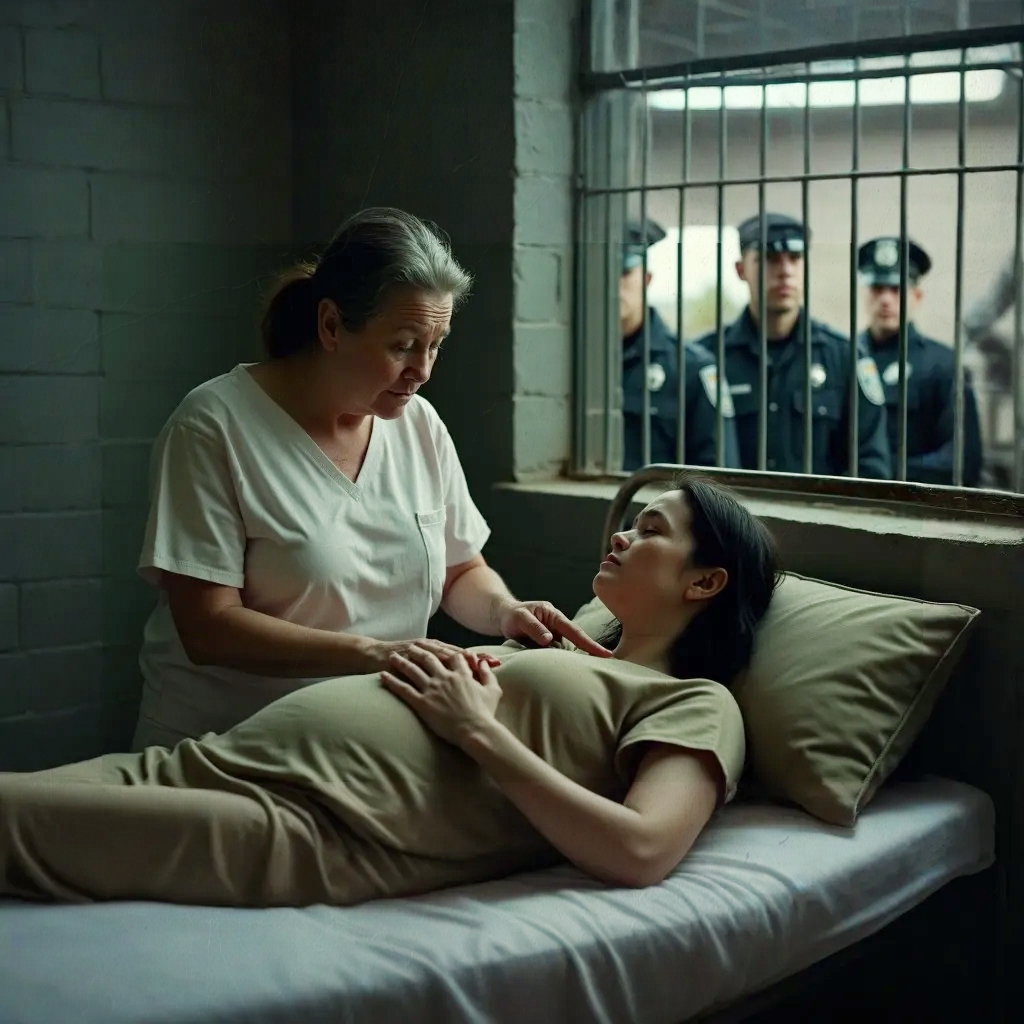Dr. Barbara Gibbs had just stepped into her shift at the quiet, small-town hospital maternity ward, where everything was calm, the patients well-settled, and the morning sun shone through the windows. She anticipated an uneventful day, possibly with time to enjoy a warm cup of tea. Little did she know, her shift was about to take a drastic turn.
The ringing of the phone shattered the peaceful morning. Her nurse, Anna, rushed over to inform her, “They’ve brought in a prisoner! A woman in labor.”
Dr. Gibbs furrowed her brow in confusion. “What on earth is a prisoner doing here? This isn’t a place for that sort of thing.”
But before she could voice her concerns, the nurse continued, “She wasn’t supposed to be here. She went into labor during her transfer to the women’s prison. They’re bringing her straight to us.”
Grabbing her white coat, Dr. Gibbs headed downstairs to the emergency room. She could already hear the murmurs and footsteps echoing down the corridor. As she approached, she saw the woman lying half-reclined on a couch in the ER, groaning in pain. Her face, pale and contorted, looked exhausted as two guards hovered nearby, clearly unsure of what to do in such an unexpected situation.
“Get her up for sanitation,” Dr. Gibbs instructed after a swift examination. She motioned to the orderlies, signaling them to prepare for the transfer to the delivery room.
The woman was carefully lifted onto a gurney, and Dr. Gibbs started walking toward the maternity ward. But as they moved, the guards began to follow, their footsteps heavy and deliberate.
Dr. Gibbs paused and turned. “Where do you think you’re going?” she asked, perplexed.
One of the guards responded, “She’s a prisoner. We’re required to stay with her during her time here.”
Dr. Gibbs’s eyes narrowed, and her voice was firm. “I understand she’s a prisoner, but this is my ward, and this is a delivery room. We have protocols, too, and the birth of this child is the only priority now.”
“We have our own protocols,” one of the guards retorted, his hands on his belt. “We can’t leave her unattended. She’s dangerous.”
Dr. Gibbs stood her ground, her gaze unwavering. “Right now, she’s a woman in labor, and I’m in charge here. Not you. If you want to stay, fine. But this is a medical procedure, not a security matter.”
The guard hesitated before muttering, “But if we can’t stay, she must be handcuffed.”
Dr. Gibbs sighed deeply, feeling the weight of the situation. “Fine. Handcuff her if you must, but I will not allow this moment to be dictated by anything other than the safety and well-being of this woman and her baby. Understood?”
The guards, though disgruntled, reluctantly complied. As they entered the delivery room, one of them reached to secure the prisoner’s wrist to the bed, fastening the handcuffs firmly around her delicate wrist. The woman barely winced, her breath shallow as contractions rolled over her. Her eyes locked with Dr. Gibbs’s, who saw a momentary flicker of fear and vulnerability.
Dr. Gibbs moved to the side of the bed, gently patting the woman’s shoulder. “You’re doing great,” she said, offering what comfort she could in such a sterile environment.
The woman nodded, tears brimming in her eyes. Her labor was progressing quickly, and there was no time to waste.
The guards were told to leave, and as they exited, they muttered in frustration. “This isn’t how it’s supposed to go. What if she escapes?”
Dr. Gibbs didn’t spare them a glance as she focused on her patient. “She’s not going anywhere. Focus on helping her bring this baby into the world.”
Hours passed, and the delivery room was filled with the steady rhythm of the woman’s breathing and the reassuring commands of Dr. Gibbs. With the guards’ presence now a distant memory, the focus was entirely on the birth. And in that intense, private moment, as the woman screamed in pain and pushed through the final stages of labor, a miracle occurred.
The baby cried loudly for the first time—a healthy, strong cry that echoed through the room. Dr. Gibbs smiled as she cut the umbilical cord, placing the newborn in the woman’s arms.
“You did it,” Dr. Gibbs whispered, her voice soft with compassion. “It’s over.”
The woman looked down at her child, her eyes filled with a mix of relief and love. Despite the chains on her wrist, despite the guards waiting just outside the door, in that moment, she was just a mother.
“Do you have a name for him?” Dr. Gibbs asked, her hands gently adjusting the baby’s blanket.
The woman paused, her face softening. “Isaiah,” she whispered. “His name is Isaiah.”
As Dr. Gibbs watched the woman cradle her son, she knew this moment would be one of the most unexpected and emotional of her career. In a room meant for new life, the boundaries between freedom and confinement, pain and joy, seemed to blur, and for a brief moment, the world outside faded away. All that mattered was the child in her arms and the bond between mother and baby, a bond that no handcuffs or security protocols could ever break.
